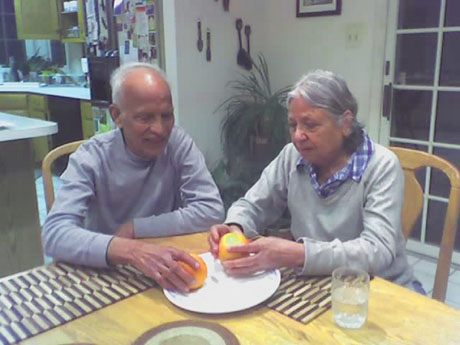|
Several times during my childhood and in later years, I heard
the argument from my parents and other advisers that the quest for educational
excellence is a worthy life goal in and of itself.
An instance of this advice was given to my mother by my
father in the 50s when they were a young, newly married couple finding their
feet in Berkeley, California.
My father was pursuing his doctoral degree in statistics and
my mother was happily exploring
golden
California. Soon, she started to get strong advice from my father to pursue
higher education, even though she may not be intending to use it to get a job or
earn money at any point in her life.

My mother entered a graduate level program in Asian Studies
at the University of the Pacific in Stockton, California. By attending lectures
by Zen-guru, Alan Watts, and learning about spiritual stalwarts like Suzuki,
Sazaki and Sneaky, she immensely improved the quality of her own life and that
of her family over the years, as she puts it.
My mother never actually used this education to earn a
living. There were never any tangible or financial benefits directly tied to her
education. Though the intangible benefits were huge. The whole family agrees
about this.
What exactly were these intangibles? To begin with, it helped
her to leave her cloistered existence in her tiny apartment for a fruitful
pursuit every day. It gave her a clear sense of purpose. She felt empowered as a
young woman who had never stepped out of her village in northern India before
she arrived in the US. In the long run, it helped her to grow intellectually and
made her more self-confident, especially in unfamiliar surroundings.
She was able to use some of her insights in the education of
her children, by instilling in them a sense of context and perspective in life.
It also eventually helped her to develop a strong interest in publishing and
marketing books in philosophy written by my father later in her life.
She also developed a lifelong interest in things ethereal,
for example, yoga, vegetarianism, natural remedies, and, lo and behold,
Tolerance and World Peace! She now continually attends and participates in such
other-worldly pursuits.
Moving from particular to general, what is the rationale for
a quest for education,
devoid of a desire to get a job?
Indian philosophy is a ready source of inspiration. In it,
the educational endeavor is referred to as
vidya.
This is to be distinguished from
gyana as
in gyana-yoga,
later expounded beautifully by Shankara in his
Vivekchudamani.
Gyana,
as referred to in Vedanta, is the knowledge of the self or
brahman,
one of the three yogic pillars of
karma,
gyana
and bhakti.
Vidya,
on the other hand, is a way station, if you will, on the path to achieving
moksha
through any of the three yogas.
Vidya is
a milestone, a necessary but not sufficient condition, to making a human being
more prepared to pursue yoga. It can be used in a variety of ways, depending on
the proclivities of the individual.
The pursuit of employment and financial well-being is just
one of these options where the
Vidya can be usefully employed. But more
importantly, Vedantic
thought envisages a deeper, more exalted reason for the pursuit of
Vidya or
education, namely, as an aid for perfection through yoga in any of its three
forms, ultimately leading to
Nirvana.
Econometrically, Vidya is an instrumental variable where the
objective function is a purpose higher than the here and now.
Vidya
can be an instrument of an enlightened self, a self that develops a broader
world view of the good life, a life that encompasses the well-being of all human
beings and living objects, irrespective of their link to one’s own life.
Vidya
can also be an instrument for developing ideas for social uplift, ideas that
would take one from the class room to the wide world of hope and freedom.
Vidya
can inspire, and propel individuals to harmonize, galvanize, and move mountains,
via truth and non-violence, in other words, vidya can inspire us to transcend
vidya, stated so eloquently by Rabindranath Tagore, in Gitanjali:
Where the mind is without fear
and the head is held high;
Where knowledge is free
Where the world has not been
broken up into fragments by
narrow domestic walls
Where the clear stream of reason
has not lost its way in the dreary
desert sand of dead habit
There, my Father, let ME awake!
|